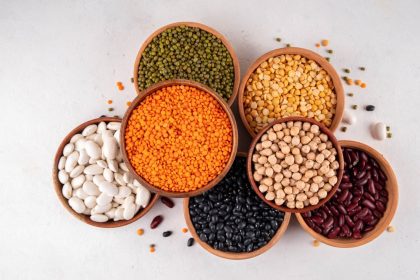Obesity continues to impact communities of color disproportionately, and Dr. Orvenie Bernardin, known affectionately to her patients as “Dr. B,” brings a fresh perspective to the conversation about this pressing health issue in the Black community. A board-certified family physician with a practice ranging from young adults to centenarians, Dr. Bernardin combines clinical expertise with cultural understanding to address one of today’s most pressing health challenges. In a candid interview with Justin VanNoy for Rolling Out Health IQ, she unpacks the complexities of obesity and its far-reaching implications for the Black community.
[Editor’s note: This is a truncated transcription of a longer video interview. Please see the video for the extended version. Some errors may occur.]
What are your concerns about obesity in the African American community?
Absolutely. So, obesity, I mean, the thing with this is a chronic disease, right? So, it’s actually a medical condition. It’s considered anytime that you have a BMI of 25 or higher or 30 or higher with any kind of comorbidities, then you would be diagnosed as having obesity. So, the thing within our community is that it’s becoming a lot more prevalent over the past few years. The numbers are going up, not just in America, but in other countries as well. We’re seeing the numbers for obesity rising exponentially over the past few years. That could be due to a number of factors. The food portion sizes have increased a lot over the past few years. Even looking at fast foods, sometimes we’ll see like if you look like back in the 1960s, the fast food portions were a lot smaller. Nowadays, it’s like three people could probably eat one meal at a fast food restaurant due to the portions. They’re about two to three sizes bigger compared to how they were in the past. So, I think based off of the eating habits and sometimes access to food and health care definitely is impacting the rise that we are seeing in obesity.
Which age groups are most affected by obesity?
Everybody, it’s across the board and we’re seeing a lot higher rates of obesity in the kids as well. So, you’re seeing kids as young as eight, seven, you know, seven, 10 years old, starting to deal with being overweight and actually the complications of being overweight even at a very young age. So, nobody is exempt. It’s across the board.
What complications arise from obesity, particularly in the Black community?
Okay, so there’s a lot of complications especially within our community because our community is definitely affected. Most of my patients are African American Black patients. So, this is the population that I currently deal with. So even in the office on a day-to-day basis, we are seeing some of these complications, right? So of course, with more weight, that increases your risk of having insulin resistance, increases your risk of having diabetes, high blood pressure, issues with cholesterol, increases your risk of having a heart attack or a stroke, because all of these things are connected. So those are certain things that we see often. It affects your bones because you’re putting a lot more weight on your bones. So, we’re seeing 30-year-olds with arthritis, 40-year-olds with arthritis, and it’s becoming very, very common. Mobility is affected. So sometimes we’ll see like a 40-30-year-old being, you know, wheelchair-bound just because of the fact that they’re not able to walk or ambulate due to the amount of weight that is on them. So, it definitely impacts a lot. And on top of that, there’s also psychological impacts of obesity. It affects how you feel about yourself and how you navigate your current social life.
How do you approach patients who are aware of their obesity but struggle with confidence and food addiction?
I mean, this is very, very common. So, this is like a common visit that we have here on a day-to-day basis. Like, you know, usually for the most part, if it’s not new information, right? If I have a patient who is obese, they usually are aware, you know, of their size. And even coming to the doctor’s office can be a scary thing because for the most part, they may be concerned whatever it is, XYZ, and they feel like the physician is just going to say, oh, that’s due to your weight. So, they easily feel dismissed even with coming, you know, into a doctor’s office. So, it’s all about, you know, a partnership in a way that we both can work together so that we can achieve a goal that is overall, you know, good for your overall health. So, the way to approach a patient like this is, I mean, it’s a conversation. It’s knowing that it’s a partnership on your side. So, it’s trying to figure out what’s the next best steps for you. And that could look a number of ways. So, one thing that I started implementing with my patients is actually therapy. I know it’s not something that’s usually talked about whenever it comes to weight loss management. But a lot of like, you know, the way that we eat, ate started usually at a very young age. So, it’s not anything that started, you know, 20s and 30s. We’ve probably been eating like that, you know, ever since we were teenagers or even younger, and sometimes it’s tied to trauma, you know, lifetime, you know, things that have happened when they were young, situations that they grew up in, access to certain foods. So, a lot of these things could be related to something that happened in your childhood that you’re now seeing the effects of it when you become an adult.
What are some quick and simple dietary changes we can make to transition from obesity to being overweight, considering that this shift itself is a significant journey?
I also want to add, like, you know, definitely for sure, like the BMI system in the US probably may not always be the best for black people, because our bone density is a little bit different. Body shape is a little bit different. So sometimes they may not adequately represent whether you’re overweight, you know, obese or so forth. So, I do want to, like, give that disclaimer. So usually, I say a better way to kind of assess it is actually just based on your abdominal girth. So ideally, stomach should be, you know, about flat. There should not be too much extra weight around the belly area, because that does go back to those risks of complications that we talked about earlier. So, there’s an association with more belly weight, more increased risk of having, like, adverse effects and adverse events.
So, with that, some quick things. I also just want to mention there’s multiple reasons to be overweight. Mine is just food and how you’re eating and how you’re taking care of yourselves. There’s PCOS. You can have hormonal imbalances, thyroid abnormalities. So, it’s important to talk to your physician, you know, first making sure that you do a complete workup to make sure that nothing is being missed, right? On top of, like, the diet and lifestyle modifications. But some quick things you could do. Sugar, right? We got to be careful with the sugar. So, the more that we can cut out sugar in the diet, and that could be sweets and drinks, just being careful with those in general. So, cutting out sodas. I’ve seen people lose significant amounts of weight with just cutting out sodas, cutting out fast food. The more that you could eat at home, better. The more that you could cook for yourself, better. And I know time can be limited. I get it. So, if you are going to eat out, the way that you eat out also matters as well. There’s salads and there’s healthy food places too. So, there’s definitely options for you within that. But I would definitely say cut out sugar for sure. Cut out unhealthy snacks and any kind of processed foods. Trying to replace those with healthier options.
Trying to limit your fast food intake and even in some level of activity. And that could literally look like walking in place. If that’s some level of activity, sitting down and just moving your legs. Some level of activity throughout the day will also help with that as well. Like if you work in an office or if you work at home, jump rope. Keep a jump rope near your desk. Every hour, every two hours, take a five-minute break. Do a little jump rope. By the time you’re done with your workday, you’ve also completed your exercise as well. So those are little tips that could actually get you moving and get you to a healthier direction in the future.
How prevalent is obesity, and do you think the community fully grasps the severity and widespread nature of this epidemic?
It’s very, very, very common. I wouldn’t say I have, like, an exact number, but definitely over 70 plus percent to 80 plus percent of my patients are within the range of overweight and obese. So, it’s the majority of people are dealing with that as well. Majority of my patients are dealing with this chronic disease. So, it’s very, very, very common.
What chronic conditions are linked to obesity, and how does it contribute to health issues like diabetes, arthritis, and other related complications?
So, the obesity, you know, kind of like we talked about earlier, linked to diabetes, so that insulin resistance, you know, the more that you eat, the more that you could have that insulin resistance. Insulin resistance can then lead to diabetes. Having that extra weight, like you mentioned, can lead to high blood pressure, can lead to high cholesterol levels, because once again, the things that we’re eating, right, may be a little bit more fatty, may have a little bit more cholesterol, which then in turn can increase your risk of heart attacks, increase your risk of stroke, increase your risk of kidney disease and any subsequent effect of that, you know, moving forward. So, it really does affect a lot. For women, being overweight can actually induce PCOS, right. So, it’s kind of like this relationship, like, yes, PCOS can cause weight gain, but getting more weight, you know, having more weight on your body can actually lead to PCOS as well. Irregular menstrual cycles can affect how likely you are to get pregnant. So, there’s a lot of things that being overweight can increase your risk of having blood clots, right. So, it kind of relates to all parts of your body. There’s not a part that is exempt.
The conversation with Dr. Bernardin highlights the complex relationship between obesity and overall health in the African American community. Her comprehensive approach – addressing not just dietary habits but also psychological factors, cultural considerations, and practical solutions – offers a roadmap for those struggling with weight management. As obesity rates continue to rise, particularly among Black Americans, Dr. Bernardin’s insights emphasize the importance of understanding this as a chronic disease requiring medical attention, community support, and individualized care. Through education, awareness, and accessible healthcare, there’s hope for reversing this concerning trend and improving health outcomes in the African American community.
This interview was conducted by Justin VanNoy in partnership with Rolling Out Health IQ, bringing vital health information to communities that need it most.













